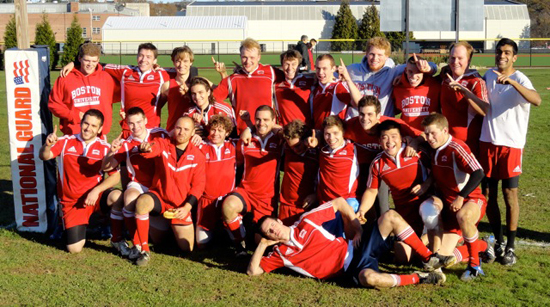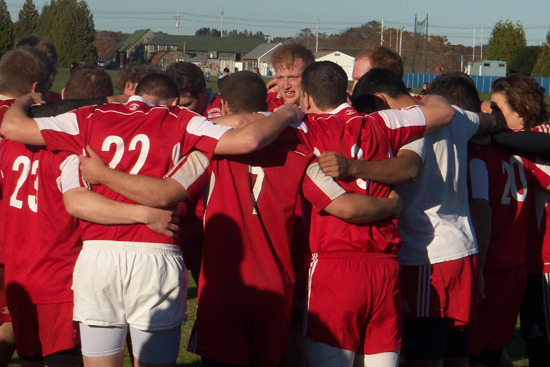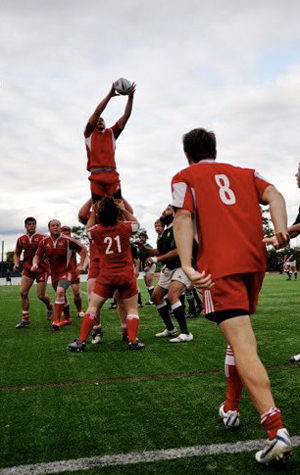A Winning Season
Men’s rugby club heads to playoffs

The 2011 New England Rugby Football Union regular season champion BU Men’s Rugby Football Club. Photos courtesy of BU Men’s Rugby Football Club
Two seasons ago, Justin Evans delivered a message to his rugby athletes.
It was just after the BU Men’s Rugby Football Club lost in the first round of the New England Rugby Football Union (NERFU) playoffs. Their head coach told them he was proud of their remarkable turnaround. They had finished as the NERFU regular season champions after a winless season the year before. Their progress was encouraging, but Evans (SED’06) told them he wanted more.
He said his players had to make a choice—they could either be a social club that plays rugby, in which case he’d wish them all the best and be on his way. Or they could dedicate themselves to becoming a truly competitive team under his guidance.
As the rugby club prepares to take on the Towson University Rugby Football Club in the Division II College playoffs tomorrow at Dartmouth College, any questions about which path the team chose should be dispelled.
“It’s been a pretty remarkable transition to see the team over the past four years,” says Aaron Stanley (CAS’12), club copresident and cocaptain. “My sophomore season, there was an obvious change in the attitude of the team. From that point on, I think that the team gained significant experience and a confidence in our ability to win.”

This spring marks the club’s third consecutive year as regular season NERFU champions, but the first time in recent memory that it has advanced past the NERFU postseason to the Division II College Playoffs. The club finished its regular season in the fall with a 6-1 record.
Evans credits players’ maturity for the club’s success. “I don’t think individually they’re much more talented than in the earlier years,” he says. “Maybe a little, but now it’s an attitude they’ve got—they’re more professional, and they’ve got mental toughness.”
“We really set out to change the culture of the team from when we were freshmen,” says copresident and cocaptain Mike Martino (SMG’12). “It’s tough getting everyone to be committed to a club sport—to get guys out to practice every day, but we did in the fall and that’s why we had so much success.”

The team has had to overcome a number of challenges. Rugby players don’t have facilities of their own and must field both an A-side squad (think varsity) and a B-side squad (more like junior varsity) for all matches. That in itself is challenging, given that rugby remains a niche sport in America, which means that the team must draw from a largely inexperienced pool of athletes.
“Rugby is a very new sport to the general American public. Because of that, it’s impossible to limit your team to people who have played rugby before,” says Stanley. “Unlike baseball and lacrosse, where there are enough people who know the game and understand the rules. We don’t have that luxury. Therefore, we need to develop players, teach them the game, and integrate them into the team.”
Evans estimates that 30 percent of his players have never played rugby prior to coming to BU, and says he must often resort to a baptism-by-fire approach when trying to acclimate them to the sport.
“The first few contact sessions usually clear a few people out, and then after that they get a chance to play against B-side and rookie-side players, so they get exposed to it that way,” he says. “They train with the more experienced players, and it’s surprising how quickly they pick it up.”
Although rugby at BU is designated as a club sport, it requires an enormous commitment from players. They practice five days a week, have weight-training sessions, and play every Saturday throughout the fall. The team’s only respite comes on Sundays and during winter months.
“It’s tough, but as a captain, I and some of the other seniors just have to go out there and try and motivate the guys to come out every day,” Martino says. “When the team starts to show up at practice less often, we have to get everyone together and rally the troops.”

“I’d say we think of ourselves as beyond a club sport,” says Stanley. “With the time commitment, I think we consider ourselves a full-fledged team, and being a club sport doesn’t come into play other than who we deal with in terms of administration.
“It won’t be too much longer until BU is pressed to consider rugby for varsity status,” he predicts.
Division I recognition is something Evans says is on the club’s radar, but in the interim, he wants to focus on building the team’s bench.
“We’ve got a huge senior presence this year—we usually lose 5 players, and we’re losing 10 or 11 from the first team this year,” he says. “So next year may be a developmental year. But long term, a move into Division I would help to get ourselves on the map.”
Stanley stresses that for now his team is simply focused on the games that lie ahead. “I think it would be fantastic to see this team go on to be a varsity program,” he says. “But here and now, I’d like to see it continue being a New England powerhouse.”
Martino’s goal is even more defined: “I hope to go to the Final Four in Utah in late May, and the only way we get there is by winning two games this weekend.
“That’s our only short-term goal.”
The BU Men’s Rugby Football Club takes on the Towson University Rugby Football Club tomorrow, Saturday, April 28, at the Corey Ford Rugby Clubhouse in Hanover, N.H. Should the Terriers advance, they will face either the Bentley University Men’s Rugby Club or the Colgate University Men’s Rugby Football Club the following day.
The Division II College semifinals and finals will be held on May 18 and 19 at Rio Tinto Stadium in Sandy, Utah.
Ben Carsley can be reached at bcarsley@bu.edu.
Comments & Discussion
Boston University moderates comments to facilitate an informed, substantive, civil conversation. Abusive, profane, self-promotional, misleading, incoherent or off-topic comments will be rejected. Moderators are staffed during regular business hours (EST) and can only accept comments written in English. Statistics or facts must include a citation or a link to the citation.